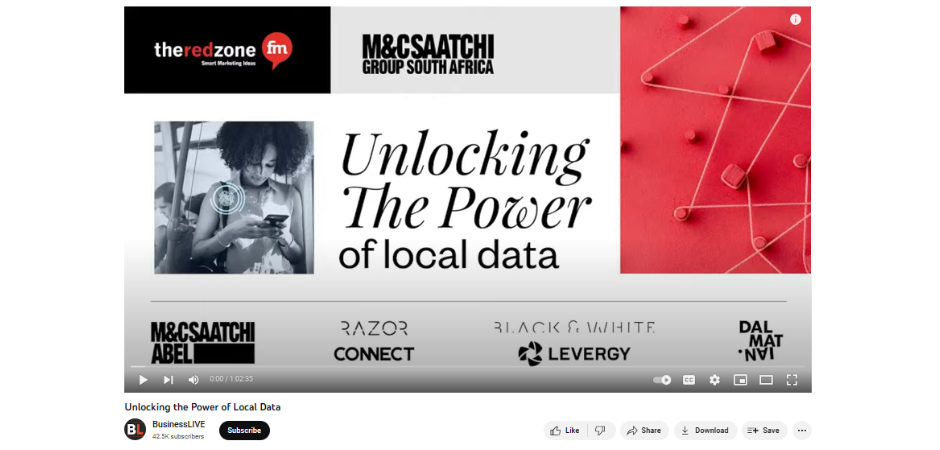Unlocking the Power of Local Data
In a globalised world, how do you unlock the power of local data?
Steven Burnstone (CEO of Eighty20) recently joined Robert Grace (Chief Strategy Officer at M&C Saatchi Group SA), Mamongae Mahlare (CEO of Takealot Group) and Amanda Reekie (CEO of ovatoyou) to discuss how marketers can better use data to help their brands achieve sustained success.
Watch this powerful discussion amongst industry leaders, hosted by the RedZone:
Source: Unlocking the power of local data (businesslive.co.za)
It’s important to incorporate different data sets to provide a more holistic view of a business and its customers
In a globalised world, the big question is how to unlock the power of local data?
A recent FM Redzone in Discussion with M&C Saatchi Group South Africa focused on precisely this issue, emphasising that data is a tool and should not be feared.
Takealot Group CEO Mamongae Mahlare said there can never be too much data. Before trying to unpack and analyse the data, she said, it’s important to establish what questions you are trying to answer. Then simplify the data. Don’t be a slave to data. Instead, be a slave to meeting customer expectations.
Takealot uses data to better understand customers and what they are looking for, and to improve offerings, pricing and communication. Mahlare cautioned that data is not a perfect science, which is why it’s important for marketers to also use their own judgment and incorporate gut feel.
Eighty20 CEO Steve Burnstone pointed out that the pace at which marketers need to adapt is increasing exponentially. A consistent theme he is hearing from clients is that they all agree that they need to use their data better, particularly in an environment where growth is harder to achieve. There is no question, he argued, that data, correctly used, can lead to sustained business success.
Differentiating between first-party transactional data, which provides an important view of individual customers, and external data such as market research, brand tracker analysis and panel research, he said it was important to incorporate different data sets to provide a more holistic view of a business and its customers. He urged marketers to have clear intent around data collection.
|
M&C Saatchi Group South Africa’s Robert Grace pointed out that in a post-Covid world, everybody wants to know where growth will come from. Data, he said, is front and centre of this discussion, particularly as sustained success requires deep foundations.
“This is a period of reappraisal. More than ever, brands need precise positioning, to understand their value proposition and then figure out how to accelerate demand,” he said.
He agreed with the other panellists that context is critical, including joining the dots and making sense of the data. He warned against using a narrow lens to analyse data, arguing that it’s important to understand what you are trying to achieve and what the drivers are.
Amanda Reekie, founding director of ovatoyou, pointed out that the data itself as not as important as what you do with it. Many organisations have large amounts of transactional data available to them and may even have a fair sense of who their customers are, but they are unable to communicate this. Companies need to nurture a culture that is comfortable with managing different data sets.
She agreed that in a South African context, local data nuances are critically important. “Data is ultimately just a set of numbers. What gives those numbers context is the social construct and an understanding that people’s lives vary significantly.”
Reekie advised marketers to work at better understanding data and brush up on how to analyse it.
The big take-out: Correctly used, data can lead to sustained business success.
